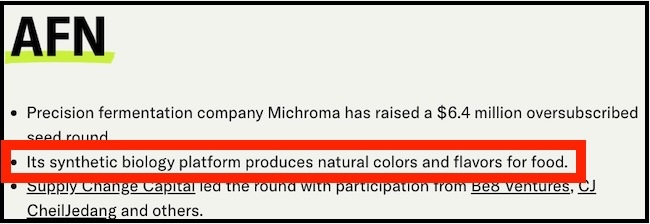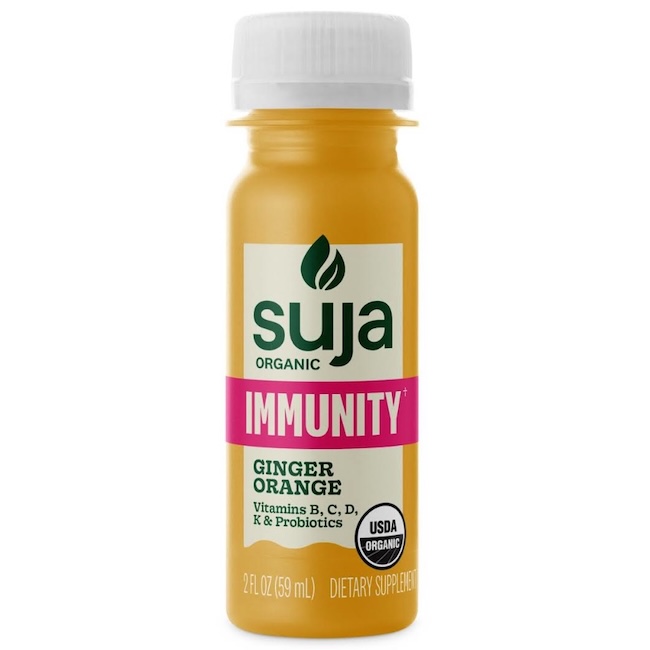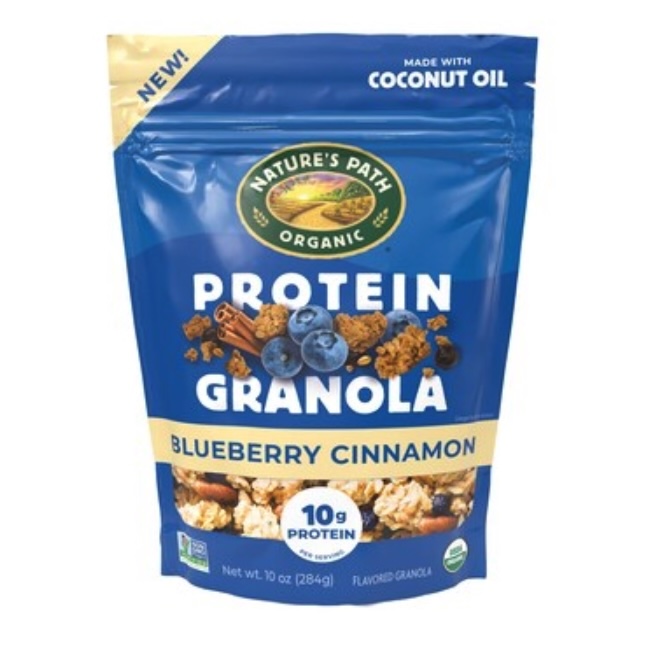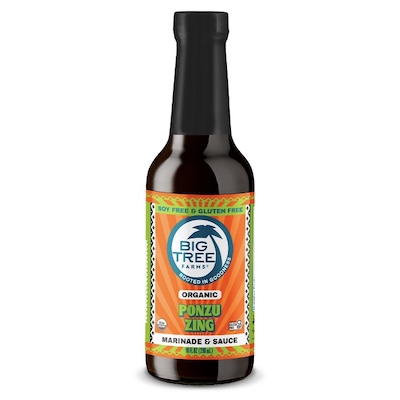
"Natural" GMO Food Colors Seek to Fill the Gap Left by the Removal of Artificial Ones
How Organic Insider operates: We accept no advertising, we have no paywalls and we make our newsletters free to everyone because vital information about our industry needs to get out to as many people as possible. Please consider supporting our work, whether you are an individual or a company. Thank you so much.
In June, Kraft Heinz announced it will not launch any new products in the U.S. with Food, Drug & Cosmetic (artificial) colors, effective immediately, and will remove remaining Food, Drug & Cosmetic colors from its U.S. portfolio by the end of 2027.
With similar announcements coming from other major food corporations, many imagined a return to natural colorings from sources such as carrots, beets and turmeric. Yet, the carefully worded press releases could mean something quite different.
One likely pivot for these companies is to use colorants produced by genetic engineering via a process known as “precision fermentation.” (Precision fermentation was the subject of a white paper by New Hope Network, which defended the use of this genetic engineering technology in the natural products industry.)
Not surprisingly, a handful of biotech startups are seeking to capitalize on this extremely large market, including Michroma (a precision fermentation company that uses synthetic biology and CRISPR), Chromologics (precision fermentation), and Phytolon (precision fermentation using modified baker’s yeast).
And they are positioning themselves as a new and viable option that is in compliance with current plans of the FDA, which has come out against synthetic, petroleum-based colors in favor of natural alternatives.
Some industry observers, however, have very serious concerns about what is being communicated.
According to Alan Lewis, vice president of government affairs at Natural Grocers and someone who closely monitors the GMO 2.0 space, “What we have seen in certain media outlets and on the websites of some of these biotech companies is a belief that genetic engineering, via synthetic biology or precision fermentation, somehow produces ‘natural’ food colors. This is absolutely preposterous and very deceiving to shoppers.”
 (Taken from an article in the AgFunderNews website about Michroma)
(Taken from an article in the AgFunderNews website about Michroma)
So far, the FDA has not specifically addressed food colors derived from genetically-engineered, precision fermentation methods, but ultimately, Congress has the final say when it comes to banning GMO colors and no such law is being discussed.
INHERENT COMPLICATIONS
While these biotech companies aim to satisfy both FDA policies and the needs of their Big Food clients, educated consumers are increasingly looking for food colorings that are not only non-synthetic but non-GMO and offer full transparency as well.
Unfortunately, significant regulatory and labeling challenges stand in the way, and even if colors from precision fermentation are produced using genetic engineering, they may not be labeled as such.
That is because under the National Bioengineered Food Disclosure Standard, bioengineered foods containing undetectable modified genetic material do not require disclosure. Furthermore, according to the Non-GMO Project, new genomic techniques such as CRISPR, TALEN and RNAi are currently untestable, and without a commercially available test, those foods do not mandate a bioengineered food label.
As a result, some precision fermentation companies may declare that their food colors are non-GMO.
But independent certifiers view things differently.
“Precision fermentation companies that utilize genetic engineering in any part of their process will be denied Non-GMO Project verification,” said Megan Westgate, executive director of the Non-GMO Project.
RISING PUSHBACK
Consumer advocates are already signaling they will not let the issue go unchallenged, and among them, Vani Hari — the influential activist who led the protest against Kellogg’s synthetic food colors — is not sitting by idly.
“If Big Food thinks they are going to switch from artificial food dyes to risky and unproven genetically-engineered colors — without anyone noticing or understanding what is going on — there will be massive backlash again. This movement is about improving our food system and protecting consumers, and anything less than that will be met with fierce resistance.”
In the 2010s, the fight for GMO-labeling galvanized shoppers nationwide.
Today, precision fermentation’s use of ‘natural’ could trigger a similar wave of scrutiny — the very thing the GMO industry hopes to avoid.
 |
With gratitude, 
Max Goldberg, Founder |
Quick Hits
* On September 27 in Hudson, NY, the Real Organic Project 2025 Symposium: Antitrust + Food will be held in-person and online. I will be attending.
* Dr. Bronner’s committed $100,000 to Vista, a transitional shelter for houseless youth in San Diego.
* Chicago’s Grant Park, the home of Lollapalooza, is the first park in the country to earn the Green Grounds Certification — for its commitment to organic land care, pesticide-free lawns and pollinator protection.
* The Collaborative Integrated Value Chain (CIVC), a phenomenal initiative that we featured last year, has announced that Cybele Pascal is its new Chief Commercial Officer.
* Sacramento is paying homeowners to “scrap” their lawns.
* Organic ginger producer La Grama is joining the Peru 2M Campaign, a national research initiative that will analyze 2 million soil samples to create the country’s first comprehensive soil fertility map.
* Community Kitchen, a NYC non-profit restaurant led by Mark Bittman, opens today in Alphabet City.
* Banana workers face a ‘worsening crisis’, says a new report.
* Clemson University announced its 2025-26 Going Organic webinar series.
* In Austria, government health care can look a bit like a spa.
New Organic Products
Wellness Shots from Suja Organic
For a limited time only, three Wellness Shots from Suja Organic are available at select Whole Foods Market stores nationwide. Digestion Ginger Pineapple supports gut health with probiotics and apple cider vinegar. Immunity Ginger Orange helps to boost immunity with ginger and vitamins B, C, D and K. Detox Blood Orange supports a natural detox with dandelion root, turmeric and acerola cherry. All are USDA certified organic.Protein Granola from Nature's Path
Nature's Path has introduced a line of Protein Granola in two flavors -- blueberry cinnamon and maple almond butter. Made with pea protein and baked with coconut oil, the crunchy clusters are a source of fiber, healthy fats and sustained energy. USDA certified organic, Non-GMO Project verified, vegan and 10g of protein per serving.Soy-Free Ponzu King from Big Tree Farms
A better-for-you version of the classic Japanese marinade, Ponzu King from Big Tree Farms is a blend of the company's savory Coco Aminos with a balanced amount of sweet and heat. USDA certified organic and made without soy, gluten and refined sugars, it can be used as a marinade for seafood, meats and vegetables, or as a dipping sauce.Plastic-Free, Aluminum Coffee K-Cups from Cambio
Comprised of former Keurig executives and packaging engineers, Cambio has unveiled the world’s first aluminum coffee pod compatible with Keurig brewers, and the aluminum pod is a proprietary material structure that provides requisite brew-ability, barrier performance, shelf life and recyclability. The USDA organic coffee is sourced from small farms around the world, and it comes in a variety of different roasts and blends, including Sumatran and Colombian.
Weekly News Summaries

Study: 100% of Organic Coffee Tested Positive for AMPA
By Emily Caldwell
In an incredibly alarming study by the Clean Label Project, 100% of organic coffee samples tested positive for AMPA, a glyphosate byproduct.

Planting Naturals raises $7M for Sustainable Organic Palm Oil
The funding came from AgDevCo, and the money will be used for working capital and to grow the network of smallholder farms in Sierra Leone.
MAHA is Reshaping CPG Supply Chains, More than Tariffs Right Now, Manufacturing Platform CEO Says
By Nino Paoli
Looming food regulatory changes and social media-driven consumer behavior changes are reshaping the intricate web of ingredient sourcing, manufacturing and marketing, and shifting supply chains, said Keychain CEO Oisin Hanrahan.
Burkina Faso ends GMO Mosquito Science Experiment
By Katarina Hoije
Burkina Faso ordered a Gates Foundation-funded research program to stop its activities in the West African nation, with all samples to be destroyed.

Austria hits Milestone with 25% of Vineyards Now Organic
By Michael Huband
What may be even more impressive is that 14% of its organic vineyards employ Biodynamic growing methods.

Painterland Sisters raise 7-figure Seed Round
By Andrew Watman
The company's organic Icelandic skyr is now sold nationwide at Whole Foods Market, marking 5,000 shelves in all 50 states.
Center for Food Safety Files Motion for Summary Judgment in Challenge to EPA's Approval of Toxic Enlist Herbicides
The EPA's unlawful registration of 2,4-D and glyphosate products threatens farmers, public health and the environment.

OFRF Raises Concerns on USDA Reorganization Plan
Among other things, the Organic Farming Research Foundation believes the USDA's reorganization will erode institutional capacity agency-wide, hinder grant administration and delay on-the-ground assistance for farmers.

Texas investigates Plum Organics and Gerber for Heavy Metals in Baby Food
Texas Attorney General Ken Paxton has launched an investigation into the two companies for allegedly misleading consumers about the safety of their products.

EPA Proposal: Taxpayers, not Corporations, to Pay for "Forever Chemicals" Cleanup
By Hiroko Tabuchi
“It’s outrageous,” said Tracey Woodruff, a researcher at the University of California San Francisco who studies environmental health, particularly the effects of chemical exposures on pregnant mothers and their babies. “If they overturn this, it would leave the public responsible for cleaning up, not the companies that knowingly polluted the land.”
Want to share this newsletter on social media? You can use this link: Newsletter Link
The material in this newsletter is copyrighted and may be reprinted by permission only. All requests must be in writing. Please use our contact form to request republication rights.
Newsletter Archive
Quick Hits
* On September 27 in Hudson, NY, the Real Organic Project 2025 Symposium: Antitrust + Food will be held in-person and online. I will be attending.
* Dr. Bronner’s committed $100,000 to Vista, a transitional shelter for houseless youth in San Diego.
* Chicago’s Grant Park, the home of Lollapalooza, is the first park in the country to earn the Green Grounds Certification — for its commitment to organic land care, pesticide-free lawns and pollinator protection.
* The Collaborative Integrated Value Chain (CIVC), a phenomenal initiative that we featured last year, has announced that Cybele Pascal is its new Chief Commercial Officer.
* Sacramento is paying homeowners to “scrap” their lawns.
* Organic ginger producer La Grama is joining the Peru 2M Campaign, a national research initiative that will analyze 2 million soil samples to create the country’s first comprehensive soil fertility map.
* Community Kitchen, a NYC non-profit restaurant led by Mark Bittman, opens today in Alphabet City.
* Banana workers face a ‘worsening crisis’, says a new report.
* Clemson University announced its 2025-26 Going Organic webinar series.
* In Austria, government health care can look a bit like a spa.




